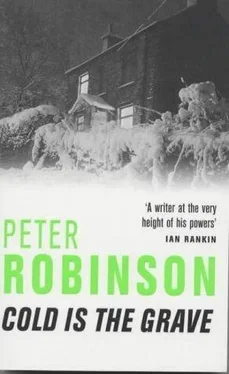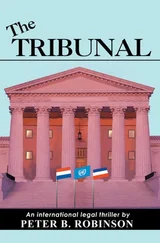“Because that’s why he joined up in the first place.”
“How do you know?”
“I don’t. I’m only guessing. But I’ve seen his old books once, when we were staying at my grandparents’ house in Worthing. They’re all, like, sixties paperback editions and stuff, with his name written inside them, all very neatly. A lot of those Penguins with the green covers. Detective stories. Sherlock Holmes. Agatha Christie. Ngaio Marsh. All that boring old crap. And I looked in some of them. Do you know what he’s done? He’s made his own notes in the margins, about who he thinks did it, what the clues mean. I even read one of them while we were there. He couldn’t have been more wrong.”
Banks felt queasy. There was something obscene about this intimate look into Riddle’s childhood dreams that made him uncomfortable. “Where did you learn the pop psychology?” he said, trying to brush the whole thing off.
Emily smiled. “There is a kind of logic to it. Think about it. Look, it’s been great seeing you, but I really have to be going. I have to meet someone at three. Then I’m off clubbing tonight.” She gathered her handbag, more the size of a small rucksack, really, patted her hair and stood up. “Maybe we can do this again?”
“I’d like that,” Banks said. “But it’s on my terms next time, or not at all.”
“Your terms?”
“No booze.”
She stuck her tongue out at him. “Spoilsport. Bye.” Then she picked up her jacket, turned with a flourish and strutted out of the pub. The men all watched her go with hangdog expressions, some of them brought crudely back to reality by harsh remarks from their wives sitting next to them. One woman gave Banks a particularly malevolent look, the kind she probably reserved for child molesters.
After Emily had gone, Banks spent a few moments thinking over what she had said. Self-analysis had not been a habit of his, and it was something he had only really indulged in since the split with Sandra, since his move to the cottage, even. There he had spent many a late evening watching the sunset over the flagstone roofs of Helmthorpe as shadows gathered on the distant valley sides, and probing himself, his motives, what made him the man he was, why he had made the mistakes he had made. There he was, a man in his forties taking stock of his life and finding out it wasn’t at all what he thought it had been.
So Riddle hated him because he was a natural detective and because he appeared to have a life, including this illusory mistress. Some of Riddle’s envy, then, if that was what it was, was based on error. What could be more pathetic than envying a man the life you only imagine he has? It was just a precocious teenager’s analysis, of course, but perhaps it wasn’t too far from the mark. After all, it wasn’t as if Riddle had ever given Banks a chance, right from the start. Still, he thought, knocking back the last of his pint, that wasn’t his problem anymore. With Riddle in his corner, things were bound to change for the better. As he pulled up his collar and left the pub, he was aware of the women’s eyes burning holes in the back of his raincoat.
DS Jim Hatchley was the last to arrive at the scheduled meeting that Thursday afternoon, rolling in a little after quarter past five smelling of ale and tobacco and looking as if he’d been dragged through a hedge backwards. Banks, Annie Cabbot and DCs Rickerd, Jackman and Templeton were already gathered in the “boardroom,” so called because of its panels, wainscoting and oil portraits of dead mill owners. A thin patina of dust from the renovations had even reached as far as the long banquet table, usually so highly polished you could see your reflection in it.
“Sorry, sir,” muttered Hatchley, taking his seat.
Banks turned to Annie Cabbot, who had just started an account of her afternoon at the Daleview Business Park. “Go on, DS Cabbot,” he said. “Now that we’re all here.”
“Well, sir, there’s not a great deal to add. Charlie turned up for work on Sunday afternoon, as usual, logged in, and he went home at midnight. His replacement for the midnight-to-eight shift, Colin Finch, says he actually saw him at four and midnight, so we know he was still alive when he left the park.”
“Did this Finch have anything more to tell us?” Banks asked.
“Said he hardly knew Charlie. They were ships that passed in the night. His words, not mine. And he’d no sense of anything dodgy going on at Daleview. Nobody else I spoke to there admits to knowing Charlie, either – not surprising, when you consider he was usually at work when the rest had gone home – and there had been no incidents reported at the park, so he didn’t even have very much to do.”
“Could his death be unrelated to his work, then?” Banks asked.
“It’s possible,” Annie said, glancing at Hatchley. “After all, he did have form. Mixed with some pretty rough company in his time. But there was one odd thing.”
“Yes?”
She took an envelope out of her briefcase and set it on the table. “One of the companies operating out of Daleview – PKF Computer Systems – cleared out lock, stock and barrel on Sunday evening.”
“Moonlight flit?”
“No, sir. All aboveboard, according to Colin Finch. Just very short notice. They were gone by midnight, when he started his shift.”
“Couldn’t pay their bills?”
“They weren’t owing when they left, but I should imagine a cash-flow problem might be at the back of it all.”
“Likely,” said Banks. “But they did nothing wrong?”
“No. Interesting timing, though, wouldn’t you say?”
“I would.” PKF had cleared off during Charlie Courage’s final evening shift. Banks didn’t like coincidences any more than any other copper worth his salt. “Go on.”
“Anyway, Ian Bennett had given me carte blanche and the keys were all there in Mr. Courage’s old office, so I had a quick shufti around the PKF unit.”
“Find anything?”
“Clean as a whistle. They’d obviously taken care to make sure they left nothing behind. Except this. I found it lodged behind the radiator. It must have fallen there.” She held the envelope and tipped it. A cracked plastic case about five-by-five-and-a-half inches fell onto the polished table’s surface.
“A CD case,” said Banks. “I suppose you’d expect to find something like that if they were in the computer business. Software and all that.”
“Yes,” said Annie. “It probably means nothing. In fact, the whole PKF thing’s probably nothing, but I handled it carefully just in case. We might want to check with fingerprints.”
“You think there’s something dodgy about PKF?”
Annie leaned back in her chair. She even looked comfortable in the notoriously hard and bum-unfriendly boardroom chair, thought Banks. “I don’t know, sir. It’s just the timing, them leaving the same weekend Courage disappeared. It might be worth looking into the company, see who they are, what they do. It might help explain Charlie’s sudden riches.”
Banks nodded. “Right you are. You can get stuck into that tomorrow. And it wouldn’t do any harm to get in touch with Vic Manson about those prints, either. If someone working at PKF turns up in our records, as well as Charlie…” He glanced over at the three DCs at the far end of the table. They had been on a house-to-house to find out if anyone had seen Charlie Courage after Sunday lunchtime. “Anything on the victim’s movements?”
Winsome Jackman spoke first. “A neighbor saw him going to work late Sunday afternoon, sir, and the man across the street saw him taking his milk in at about eight o’clock on Monday morning.”
“Anyone else?”
Читать дальше












